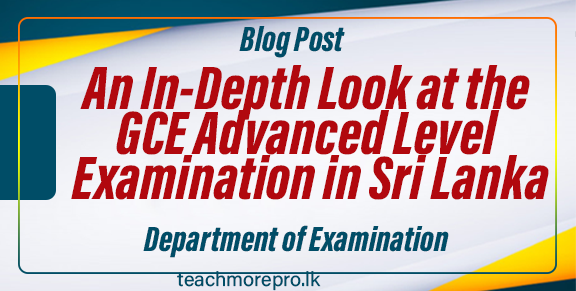The General Certificate of Education GCE Advanced Level Examination in Sri Lanka is a defining academic milestone. Conducted by the Department of Examinations, this exam marks the culmination of secondary education and serves as a gateway to higher education and professional opportunities.
Importance of the GCE Advanced Level Examination
The GCE A-Level plays a pivotal role in a student’s educational journey. It serves as the primary qualification for university admissions, and success in the exam opens doors to prestigious universities and competitive career paths. For many, achieving high grades at the A-Level is a testament to their academic excellence and dedication.
Historical Context
The A-Level system was introduced during British colonial rule to standardize qualifications for university admissions. Over time, it has evolved to address local and global educational needs, adapting its curriculum and examination formats to better serve Sri Lanka’s students and workforce.
GCE Advanced Level Examination in Sri Lanka: Structure and Subject Streams
The GCE A-Level exam offers a wide array of subject streams, allowing students to tailor their studies to their academic interests and career goals. The main streams include:
- Science: Biology, Chemistry, Physics, Combined Mathematics, and Agriculture.
- Commerce: Economics, Business Studies, Accounting, and Business Statistics.
- Technology: Engineering Technology, Bio Systems Technology, Science for Technology, and ICT.
- Arts: Subjects like History, Political Science, Geography, Sinhala, Media, and Music.
- Common Subjects: General English and General Information Technology (GIT).
Students typically spend two years (Grades 12 and 13) preparing for the exam, with rigorous coursework and continuous assessments spread across six school terms.
Exam Components
Each subject in the GCE A-Level examination comprises multiple papers that test theoretical knowledge and practical application:
- Written Papers: These include essays, structured questions, and multiple-choice questions, typically lasting 2–3 hours per paper.
- Practical Assessments: Certain subjects include practical components to evaluate hands-on skills and real-world application.
Grading System
The A-Level grading scale ranges from A (excellent) to F (fail):
- A: 75–100 marks
- B: 65–74 marks
- C: 50–64 marks
- S: 35–49 marks (minimum pass)
- F: 0–34 marks
This system not only evaluates students’ understanding of the material but also considers the overall difficulty of the exam and peer performance.
Challenges and Strategies for Success
Preparing for the GCE A-Level examination can be daunting due to its rigorous syllabus and competitive nature. Common challenges include managing time effectively, handling exam stress, and balancing extracurricular commitments.
To succeed, students should:
- Develop a Study Plan: Allocate time for each subject and stick to a schedule.
- Practice Past Papers: Familiarity with question formats and time constraints is key.
- Seek Support: Utilize school resources, attend extra classes, and form study groups.
- Focus on Wellness: Maintain a balanced diet, exercise, and get adequate rest to optimize performance.
The Pathway to Higher Education
The GCE A-Level examination is the primary criterion for admission to Sri Lankan universities. Scores from the exam, combined with the Z-score ranking system, determine eligibility for government-funded university placements and scholarships.
Official Resources for Results and Updates
The Department of Examinations’ official website (doenets.lk) is the authoritative source for updates and results. Schools also receive hard copies of results, ensuring students have access to their scores in a timely manner.
Finally
The GCE Advanced Level examination is a cornerstone of Sri Lankan education, shaping the academic and professional futures of thousands of students annually. With proper preparation and perseverance, students can leverage this opportunity to unlock their full potential and achieve their ambitions.
Also Check the Application for Practical Test of GCE A/L Examination 2024 – Click Here



